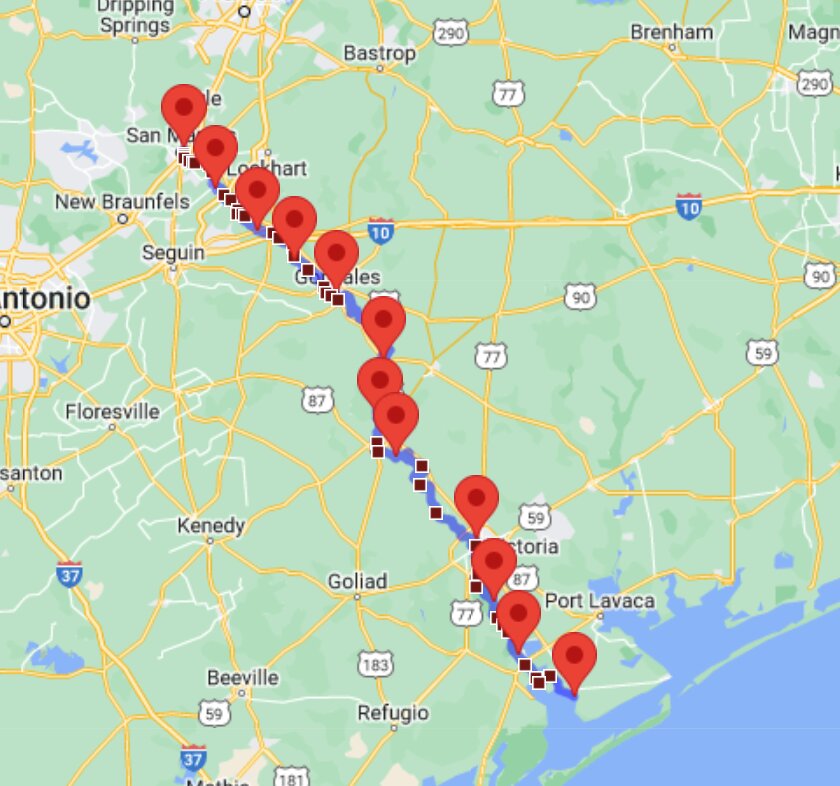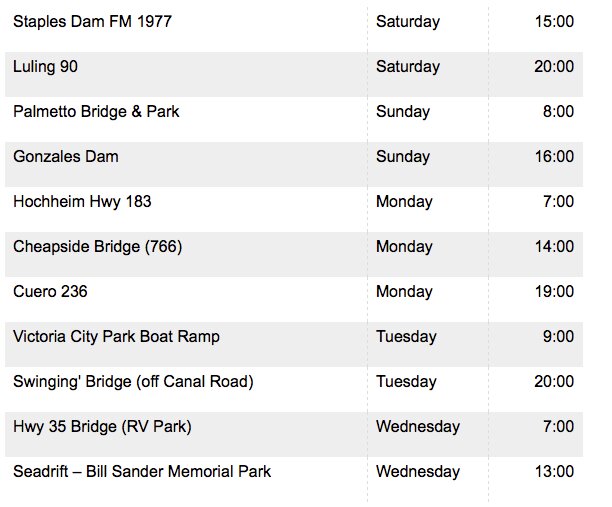Texas Water Safari returns to Gonzales to celebrate 60 years
For 60 years, organizers have called it the “world’s toughest canoe race.” And this weekend, Texas Water Safari again will have one of its checkpoints in Gonzales.
The 60th Texas Water Safari shoves off from the Texas State University Meadows Center for Water and the Environment in San Marcos (the former Aquarena Springs) on Spring Lake this Saturday, June 10 at 9 a.m.
Some 161 teams from all over the globe have signed up for this year’s race, which traverses the San Marcos River to the Guadalupe River (the confluence of the two is in Gonzales) to Guadalupe Bay and then San Antonio Bay with a finish line some 260 miles away in Seadrift. The teams have until 1 p.m. Wednesday, June 14, to cross the finish line at Bill Sanders Memorial Park — just 100 hours total.
The primary requirement is a boat powered only by human muscle. Racers must take all equipment needed with them, receiving only water, ice and food along the way.
“Its reputation has grown worldwide. It's kind of on the bucket list for people to do, and so it's a very unique race,” said TWS President Allen Spelce.
And because this is the 60th Texas Water Safari, the TWS board will be giving out one-time awards during the banquet to the 60th boat to finish, the 60th person to finish, the boat that finishes closest to 60 hours, the 1st 60-year–old man and woman to finish the race and possible others. Because, why not?
The Texas Water Safari is not just the race that takes place every year on the second weekend in June, but also includes a seminar in February, the Texas Water Marathon race in May and the Texas Jr. Water Safari in September.
Once again, heat and low waters will propose a challenge for paddlers this year, according to Spelce.
“If you haven't maintained your body that day, Saturday and Saturday night by getting proper, you know, hydration, electrolytes, food calories. Teams will typically start to crater or drop out Sunday morning, Sunday afternoon,” Spelce said.
Checkpoint 4, which for a long time was the Gonzales gravel bar (mile 85.79) to the Gonzales dam (mile 84.46). Paddlers have until 4 p.m. Sunday, June 11 to make this checkpoint. They will have a mandatory left portage at the dam to the checkpoint to be signed through by their crews. Boats will exit the river above the dam, take the portage and head down the path to put in below the dam.
“There is a cable strung 15-20 feet above the water 500 yards above the dam with a warning sign on it. Generating building on left side of the dam is usually well lit at night,” course notes state. “Must portage on Left hand side. Take out at ramp. Carry up to access road. Turn in to gate on right. Follow trail to the river. There is quite a bit of rip rap, so exercise caution.
“The next road crossing is 39 miles and this is the longest section on the race course. Make sure to have plenty of water. The dam is not conducive to team pulling over to sleep. Suggest going to Gravel Bar if planning to sleep.”
How TWS started
The following information comes from the Texas Water Safari website:
Legend has it that in 1962, Frank Brown and Bill "Big Willie" George decided to take their V-bottom boat, without a motor, from San Marcos to Corpus Christi. They accomplished their mission in about thirty days and decided that other people should have the opportunity to experience the same journey. So, in 1963 they set up the first Texas Water Safari.
Today the Safari is a long, tough, non-stop marathon canoe-racing adventure, traversing 260 miles of challenging rivers and bay. Many participants enter the race with no intention of winning, but with the goal of joining the elite group of finishers and earning the coveted Texas Water Safari finisher's patch.
Entrants must have all provisions, equipment, and items of repair in their possession at the start of the race.
Nothing may be purchased by, or delivered to, a team during the race except water and/or ice. Each team must have a team captain (18 years old, or older) whose responsibility it is to follow the team by vehicle (car, truck, or bicycle) to keep track of their location and condition and to give them water and/or ice.
During the Safari, teams may not receive any assistance of any kind, except verbal. Teams must be prepared to travel day and night, nonstop, to be competitive but teams who occasionally stop for sleep have been able to reach mandatory checkpoint cutoff times and cross the finish line by the 100-hour deadline.
For more information about the Texas Water Safari, check out texaswatersafari.org.
Comments










